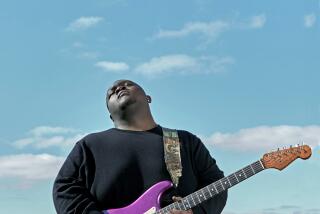‘Rising’ Tide
- Share via
In the Delta Blues Museum in Clarksville, Miss., there is a life-sized statue of McKinley Morganfield, a.k.a. Muddy Waters. There aren’t many American musicians more deserving of being so immortalized.
Waters was one of this century’s true originators, who took the Delta blues of his Mississippi youth and molded it into the equally raw but urbanized Chicago-style of blues in the late 1940s and early 1950s, amplifying guitar, bass and harmonica, adding drums and bringing into the world a powerful, hypnotic, masculine, wonderfully distorted electric-band sound.
Without Waters, Chuck Berry, the Rolling Stones (named after a Waters song), Jimi Hendrix and a great many other creative forces might never have been.
Even if Waters hadn’t been a musical pathfinder, he would be deserving of statue-ization simply for the artistic force and conviction he brought to his singing, songwriting, bandleading and wildly unfettered slide-guitar playing.
But one statue in the family is enough for Waters’ son, Williams Morganfield, who has the sufficiently formidable job when he performs of being a living tribute to his dad while also trying to assert himself as his own man.
Performing under the name Big Bill Morganfield (a nod to blues man Big Bill Broonzy, who had helped Waters’ get his start in Chicago), Waters’ son bears more than a passing resemblance to his high-cheek-boned black Buddha father. His voice is a similar wonder of genetics.
On his recent debut album, “Rising Son” on Blind Pig Records, the 43-year-old singer is backed by a group composed mainly of Waters’ old bandmates. The group includes venerable pianist Pinetop Perkins, guitarist Bob Margolin, drummer Willie “Big Eyes” Smith, harmonica player Paul Oscher and former Sunnyland Slim bassist Robert Stroger. It is the same group Morganfield will perform with at this weekend’s Doheny Blues Festival in Dana Point.
“Rising Son” sometimes eerily evokes his father, sometimes falls far shy of that and sometimes reveals a new artist who might just have a few things of his own to say.
The similarities to his famed father have doubtless opened a lot of doors for Morganfield, but they also have assured a lifetime of comparisons with an incomparable artist. In the long run, Morganfield might have been better off not using the family name.
Said Morganfield: “I never even considered that [option]. I try to keep it real. I am who I am, and that’s the way it is.”
He spoke by phone from his home in the Stone Mountain suburb of Atlanta, where Morganfield taught English at a junior high school for seven years. (His father never attended school past the third grade and made his mark on American arts and letters while remaining functionally illiterate.)
Among the things father and son have in common is that neither of their sets of parents were married, and each was raised by his maternal grandmother.
Morganfield’s grandmother, Verdell Clark, raised him in Florida, a long haul from Waters’ Chicago home, so Morganfield hardly saw his father before he was 10.
“I think my dad and I each gained something by being raised by our grandmothers,” he said, “because I think our grams can impart a certain wisdom to us, a perspective that’s a little different, because it has that extra generation going back.
“But I didn’t like growing up without my dad,” he added. “As I was growing up, I saw him play live some, and it made me feel proud, knowing that was my dad up there.
“When we talked, it wasn’t especially about music, though. We just talked like a father and his son would, about everything,” he said. “We got pretty close eventually, but I still feel like he left before I had a chance to get as close as I wanted to.”
‘Walking in the Same Steps’
Morganfield had toyed with a guitar while growing up, trying to pick along with the pop songs on the radio. After Waters died in 1983 (of a heart attack at age 68), Morganfield began playing more in earnest, coming to better know his father through his music.
“I’d sing and play along with his records, paying attention to how every part of it was put together. Now, when I play, it makes me feel closer to him, spiritually tied to him. I feel like we’re on common ground, walking in the same steps down the same street.”
That remained a household preoccupation until 1989, when Morganfield was called onstage to perform with guitarist Lonnie Mack at an Atlanta show. The applause he got whet his appetite to perform, but the band he subsequently put together never arrived at the sound he wanted, he said.
After a couple of months, Morganfield quit that and went back to playing at home with just his wife and family for an audience. About four years ago, he got an offer to play at a nightclub in Chattanooga, Tenn.
“There was a sell-out crowd and a lot of press,” he said. “I thought I did pretty good too, and it just went from there. I started doing music part time, doing shows in town along with teaching, and I started getting more and more requests to do more and more shows,” he said.
Eventually he quit teaching to do music full time.
“In both areas, you’re just getting in front of people and performing. . . . I just go up and do what I love to do. It took some getting used to for my family, but they like it too--especially when I come home with money.”
Morganfield had met guitarist Margolin when the latter had been touring in Waters’ band. “I’ve always turned to him for guidance once I started dealing in the blues.
“When I signed with Blind Pig, I told them that I wanted Bob to play on the CD and produce it. Then Bob brought everybody else in. I had also met the rest of the band when they were touring with my dad, but I didn’t really get to know them until later.”
Morganfield said many of his students had been aware of Muddy Waters.
“They had these calendars up in school with pictures of famous black people, and my dad was one of the people, so the kids knew,” Morganfield said. “Knowing about him and listening to him are two different things, though.
“I know my dad was upset that young blacks were going away from the blues. He never said why he thought it was that way. It was just an observation he made. I don’t know if I’d call it a problem, because everybody’s entitled to whatever interests they want to pursue. But that’s the way it is. Even today I don’t see many blacks at my shows. They are predominantly white crowds.
“As for myself,” he said, “as a young black, if my daddy wasn’t who he was, I probably wouldn’t have had anything to do with blues, because blues is not the happiest kind of music in the world, you know?
“But once you let that music inside you, there is so much feeling and tradition in it. What I try to do when I play is to share that and to make people go home wanting to grab some more of the music and listen to it, to keep it going.”
More to Read
The biggest entertainment stories
Get our big stories about Hollywood, film, television, music, arts, culture and more right in your inbox as soon as they publish.
You may occasionally receive promotional content from the Los Angeles Times.










